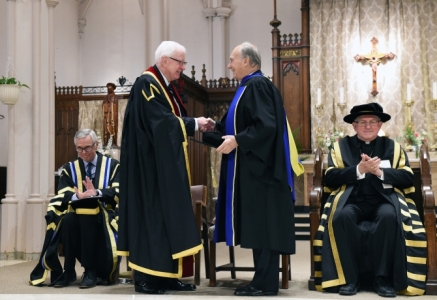Aga Khan receives Honorary Degree from Toronto’s Pontifical Institute of Mediaeval Studies 2016-05-20
Toronto, Canada, 20 May 2016: The Pontifical Institute of Mediaeval Studies, the oldest humanities research institute in Canada, today conferred an Honorary Degree of Doctor of Letters upon His Highness the Aga Khan, in recognition of his work to advance, and advocate for, pluralistic societies across the globe.
His Highness the Aga Khan, an honorary Canadian citizen and Companion of the Order of Canada, is the 49th hereditary Imam of the Shia Ismaili Muslims and founder and chair of the Aga Khan Development Network. The ceremony was held today at St. Basil’s Collegiate Church in Toronto. The degree was conferred by the Institute’s Chancellor, His Eminence, Thomas Cardinal Collins, Archbishop of Toronto.
Delivering the citation, Mr. David Mulroney, President of the University of St. Michael's College and former Ambassador to the Republic of China, said: “Let us celebrate today our own connection to His Highness, a champion of pluralism, a transcender of borders and barriers, and a great, wise and benevolent connector.”
The Pontifical Institute of Mediaeval Studies was founded in 1929 and received a papal charter in 1939. The Institute is an institution of academic researchers dedicated to transmitting the inheritance of the Middle Ages to new generations, and to deepening the understanding of the life and ideals of today’s Western culture through an understanding of the time of its first origins.
The Institute has recently taken a specific interest in the transmission of Arabic learning, Persian language and literature, and Islamic civilization. In 2014, it launched an initiative which explores the three great Abrahamic faith traditions – Judaism, Christianity and Islam – in the Middle Ages and concentrates on the inter-relationships and major points of contact during this period.
- 7362 reads
 Ismaili.NET - Heritage F.I.E.L.D.
Ismaili.NET - Heritage F.I.E.L.D.